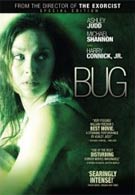First, to clarify, this is not a horror film about killer insects attacking a scantily clad Ashley Judd in a motel room. But it might be. Since Ashley IS scantily clad and there ARE insects supposedly all about. However, since they are never seen by us we can’t be sure if they really exist and since Ashley is trying her damn best to look worn down, dirty and white trashy, the scantily clad part is not exactly going to fire up the Cinemax late night schedule. No, this is clearly a film that’s not going to be everyone’s cup of tea. To expand on that tired cliché’, it’s a film made for “discriminating audiences”. Like the ones who seek out experimental theater in venues far off-Broadway. Which is where this claustrophobic Bug came from originally without any genre label attached to it. It’s an offbeat, shocking tale by playwright Tracy Letts that is not a horror film in the hockey mask/red & green sweater tradition but is nevertheless intense, disturbing and really laugh out loud funny. It’s just not going to cue you when to scream or laugh.
Ashley Judd plays Agnes White, a fragile and lonely woman who lives in a state of fear and depression in a small motel room in the middle of nowhere. She’s frightened by a series of unidentified phone calls she thinks is her abusive husband Jerry Goss (an excellent and very “pumped up” Harry Connick, Jr.), just out of prison. Agnes works in a bar and has one friend R.C. (Lynn Collins) who, for some reason, brings a guy she just met over to Agnes’ place one night while they go about doing a few lines of coke washed down with liquor. The guy, Peter Evans (Michael Shannon), spends much of the night in the bathroom and barely says a word. When he does talk he cannot help but reveal that he’s a complete and utter nutcase who just might be totally insane.
What’s more insane and reveals Bug to really be a black comedy about co-dependent relationships is that Agnes doesn’t really find him that weird. She’s, of course, vulnerable and needy so it’s clearly possible that she’s just looking past his shortcomings. But here’s a guy who’s first line is “I’m not an ax murderer” and he says it as though he’s been mistakenly introduced and just wanted to clear up the issue. He also has a totally wild story about how he was experimented on by the military and escaped from one of their desert facilities with millions of aphids living in his skin. The motel seems to be in a helicopter “frequent fly zone” and whenever the chopper blades are heard, Peter goes nuts with fear that “they” are coming for him.
This is the real crux of the story. Since Agnes has co-dependency issues, she quickly finds that she needs Peter and desperately wants him to be sane. So, she goes along with this “Bug” thing and even helps out with his experiments like a loyal girlfriend hoping one day he’ll put his microscope and “Bug” obsession away in the garage and just mow the lawn. Things get a bit hairy when he begins to cut into his flesh to remove the aphids since there appears to be very little real estate on his flesh not occupied by the little creatures. It’s here that Agnes seems to have crossed the line as she claims to see the bugs herself and somehow joins in and adds to his crazy mythology by casting herself as the “Super Mother Bug” in a way that makes their relationship not only needed, but phrophesied.
It’s easy to see why William Friedkin found the material attractive. It’s always the dark side of the dark that this director finds compelling, whether it’s Popeye Doyle’s accidental killing of an FBI man at the end of The French Connection or Father Karras’ sacrifice to the demon Pazuzu in The Exorcist. Friedkin’s characters rarely have an easy way out of their predicaments. While this is no French Connection or Exorcist,Bug is a very worthwhile entry in his body of work. While his talents with shocking and provocative material are well known, Friedkin is also especially skilled at filming plays set in tight quarters. Several of his films, including an adaptation of Harold Pinter’s The Birthday Party , his Showtime cable adaptation of 12 Angry Men, and his episode of the 80s Twilight Zone revival “Nightcrawlers” demonstrate his knack for keeping a small setting visually interesting without resorting to lame attempts to “open up” a play to more locations as though that made it somehow more “cinematic”.
Letts’ screenplay seems to be simply a word for word transcription of his play and this is a good choice since the story needs the confines of a small space and a complete isolation from the outside world in order for its own logic to take over. Some of the funniest moments are where Peter attempts to take back control of his own mythology when he doesn’t like where she’s taking the story. It’s like a couple of kids playing “make-believe” who argue over whether the planet they’ve “landed on” has oxygen or not. None of this would be funny or interesting if we weren’t locked in a small room with these crazy characters and their rationalizations.
The acting is really beyond criticism. Michael Shannon originated the role on the stage and I cannot imagine anyone else in his place. Both he and Ashley Judd go to such extremes in their performances that you actually worry that they might embarrass themselves. It’s that kind of material, but they never do and never appear to be anything but committed to the story. It’s really an actor’s showpiece and any intrusion of camp or dishonesty would destroy the whole illusion of a separate reality.
Your Daily Blend of Entertainment News
While not really a “horror” film, “Bug” contains more weirdness, tension and suspense than most other “genre” releases last year. But it has something else going for it as well: intelligence. Friedkin has put together a film that provokes and raises questions about paranoia and mass hysteria that remain disturbingly unanswered by the film’s end. Lionsgate seems to want to promote this film just like their usual genre product, but saying it’s a “psychological thriller” on the box art does not bode well when it turns out to be something less specific. It’s “psychological” and “disturbing” but never “thrilling”. People usually like to get what they paid for.
Visually, this is a nice transfer with good detail in the film’s various dark motel room scenes. The soundtrack (always important in a Friedkin film) is great in 5.1 with all kinds of odd effects that play mindgames with the images onscreen.
There’s the usual trailers for other Lionsgate flicks and a behind the scenes documentary called Bug:An Introduction. This is very spoiler heavy so it should not be watched as an “introduction” at all. Save it for after the movie. It contains interviews with the cast and director Friedkin, all who seem to be very aware they are working on some wild material which they discuss very openly.
The main event of the DVD extras is Friedkin’s audio commentary and a near 30 minute featurette called, A Discussion with William Friedkin. The commentary is okay but uneven. Friedkin swings from discussing technical issues to merely telling us what we’re seeing onscreen. He is, as always, very precise and full of energy however, and the commentary remains informative. But it’s the featurette that makes this a must-see for any film buff or fan of the director’s work. For almost a half hour, Friedkin discusses his entire career from the early documentaries to his back to back hits of the early ‘70s. What is most illuminating is his discussion of how the film industry and audiences themselves have changed over the years and how filmmakers have to keep up. No matter what anyone may think about the man himself(and if you’ve read Peter Biskind’s autopsy on the movie brat generation “Easy Riders, Raging Bulls” you’ll think he’s nothing but a complete S.O.B) Friedkin is an excellent craftsman. He is also not one bit cynical in his views and remains excited and inspired by filmmaking now. It’s the cherry on top of an unusual film that, like Friedkin’s To Live and Die in LA”, Sorcerer and Cruising will most likely be reexamined in the future.

